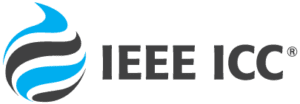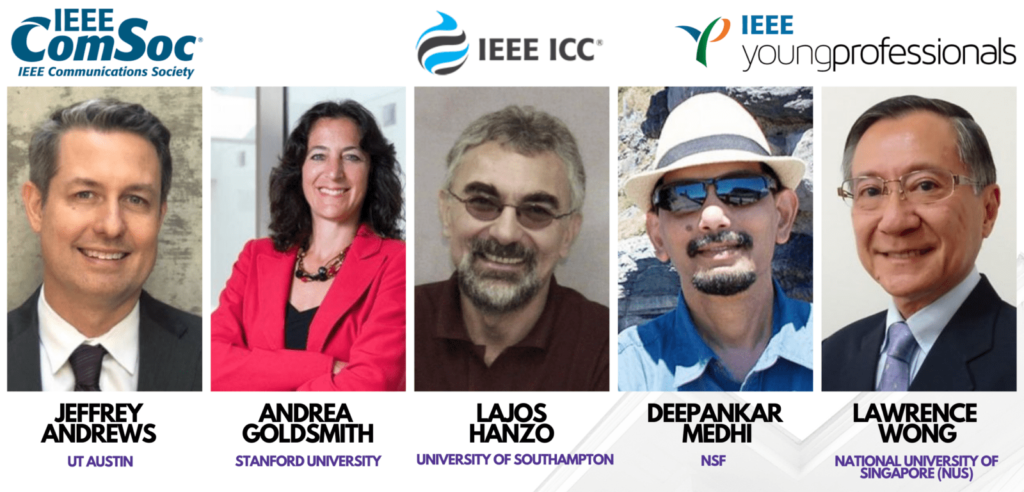During the virtual ICC 2020, IEEE ComSoc Young Professionals hosted multiple webinars on career growth, volunteering and writing research proposals. These webinars were exclusively targeted at early career professionals attending the conference, but also open to anyone not attending the conference. Speakers for webinars included many experts such as Andrea Goldsmith from Stanford University, Jeff Andrews from UT Austin, Lajos Hanzo from University of Southampton, Deep Medhi from NSF and Lawrence Wong from NSU Singapore. Recordings of these sessions is available at ICC virtual platform for the registered audience. But, here are some highlights of all the sessions.


Fireside Chat with Andrea and Jeff
Andrea Goldsmith and Jeff Andrews discussed multiple issues faced by early career professionals ranging from selecting a research topic to finding right collaborators. Andrea highlighted the importance of choosing the topic.
Andrea: Be passionate about what you want. And be sure to define what a bright future for yourself and your expectations are for work and your personal life.
Jeff talked about how early career professionals should value the quality of the work more than quantity of publications.
Jeff: You will be judged by your best paper and your worst paper, so be sure to look at quality over quantity. When you think about your career think about describing what you have done and then how you have inspired people.
Session with Prof Lajos Hanzo
Suggestions on Grant Proposals by Deep Medhi
The focus of Deep’s talk has been on funding proposals by the science and engineering foundations of a specific country (and not industry), highlighting that different countries – and different programs in different countries – generally have different evaluation criterias and priorities. It is important to take these into account when writing the proposal. Specifically, when discussing the U.S. National Science Foundation (NSF), Deep mentioned indicators such as intellectual merit (which includes factors such as the scientific merit of the proposal and the PI track record, among others), broader impact (e.g., with respect to education, undergraduate engagement, inclusion of underrepresented groups), and possible solicitation-specific criterias.
After describing the basics of the review process, and underlining the importance of integrity and confidentiality of the review process, Deep gave a few pieces of advice for a successful proposal: (i) it should be well written, well organized, easy to read (content is easy to follow, as well as font, margins, figures are done properly) along with preliminary results to convince the reviewer the promise of the proposed research work; (ii) the references should be appropriate (NSF has generally no page limits for references) and properly cited; (iii) the proposal needs to be consistent in its different sections.
The final Q&A session discussed topics such as risk management, broader impact, collaboration with other co-PIs. Moreover, Deep addressed an important issue for young researchers, i.e., the track record of the PI. Young professionals can tap into some dedicated funding programs (in which the proposals are compared to those by other young professionals), and, in general, should strive to make the reviewer understand that the PI can execute on what is being proposed, for example, by highlighting previous contributions in the area.
Volunteering for ComSoc
There were three interactive “Volunteering for ComSoc” sessions at ICC 2020 this year. The schedules of these sessions were organized such that we could cover a large number of audiences from all corners of the world. Each session would start with a brief introduction about IEEE ComSoc and the kind of events and publications IEEE ComSoc manages in different area of interest. In what follows, we introduced Young Professionals (YP): someone who has graduated from their first professional degree within the past 15 years. We discussed how we find and engage volunteers, particularly, at both ComSoc events and local levels. We shared the ways to connect with volunteers and help each other in contributing the community. In doing so, we explained several mentorship and leadership opportunities available to strengthen the YP community as a whole.
In each of the sessions, IEEE ComSoc YP Committee members shared their experiences as volunteers and the kinds of work they are engaged with in particular. These sessions were followed by active and open discussions between the attendees and the committee members. The committee members answered all the questions and queries from the attendees.
To sum up, each session went great! We got an expected number of enthusiastic attendees with several interesting discussions in between the sessions. It was the first time we did such virtual sessions at any of the IEEE ComSoc events and we hope we did our best. We thank all of the participants and hope to have them on board soon.

Pingback: Sneak Peek at YP Week: GLOBECOM 2020 – IEEE ComSoc Young Professionals